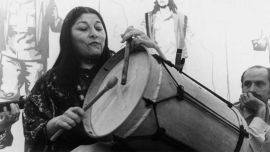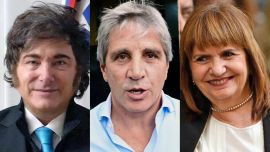Former Cabinet chief, ex-Tigre mayor, once national deputy and Frente Renovador leader Sergio Massa is odds-on to become the next speaker of the lower house Chamber of Deputies after joining up with the Frente de Todos coalition. In his new post, Massa will be in charge of sealing deals with Córdoba Peronists, the Radicals and the post-Macri PRO party and will need to win backing in order to smooth the passage of important legislation. In this interview, conducted with Perfil’s Jorge Fontevecchia, he discusses Peronism, Cristina Fernández de Kirchner, Alberto Fernández, the government’s performance over the last four years and more.
What was becoming friendly with Cristina Fernández de Kirchner like? What was going on in your mind at the time?
It’s not a question of friends or enemies – we’re not in kindergarten. At that time the country required those who believe that [Mauricio] Macri had failed to take responsibility, and we shared thinking regarding Argentina’s economic course.
So there was no emotion there?
I try to keep personal emotions out of political issues, save when it comes to pain. People’s pain does move me. But political dialogue cannot be influenced by personal grudges or likings. It has to be serious.
How long had it been since you last saw her?
Eight or nine years.
Did you talk about the mutual criticism during those years?
The first meeting lasted five hours. Obviously in all that time we went over a few things but we also looked ahead. Anyway what was said belongs to the private sphere of a dialogue between two people.
Did you imagine her as a vice-president?
I was convinced that she was not going to be a presidential candidate – the international and regional scenarios, the situation of the country itself all required starting a new and superior phase. The decision to promote Alberto was a very smart move – he’s the point at which the dialogue of all those sectors forming or joining Frente de Todos converges.
Looking at the PASO result, might it not cast doubt on the affirmation that Cristina could not win alone?
Some people add up the votes of Unidad Ciudadana and the Frente Renovador as mathematically reflecting the PASO result but mathematics is useless in politics. Some combinations add value and others take it away. This one was the former case because we understood that the most important thing was Argentina.
So you still think that Cristina alone was not enough...
It’s not worth thinking about, there’s no factual basis.
Was your political consultant, Antoni Gutiérrez-Rubí, who left Cristina Fernández de Kirchner in 2017, surprised when she decided to go for vice-president?
We never spoke in those terms. What I asked of Gutiérrez-Rubí was to consolidate the links with our voters. I wouldn’t debate internal party issues with him, that’s something I do with the leaders of my political force.
He was hoping you’d be the candidate and not Alberto...
He was working for me to be president, OK, that was his job. My sense of vocation and desire to be president also remain intact. But I have time and I’ve learnt that the collective interest comes before the personal. Yielding over some point is to surrender your passion, your body to politics.
At times it adds grandeur.
It was the moment for grandeur, to show myself as ready to make a gesture to bring the pain of the Macri government to an end.
Some pundits say that you negotiated very well on behalf of your people, did you find Kirchnerism generous?
Frente de Todos was smartly constructed. It’s not a question of who giveth and who taketh away. Everybody gave up something and everybody contributed something. That’s part of the internal discussion preceding the definition of the lists. In that process you have to try to make your strengths prevail while hiding your weaknesses. But what’s important is not the negotiation but the result. The nicest thing happening to me in these months has been to campaign with the conviction that we would score a great victory on August 11 and be elected by the Argentine people on October 27.
Did the margin of victory in the PASOs surprise you?
Not at all, quite the contrary. Even within the Frente de Todos some comrades thought me mad because I was so sure that the difference would be huge.
Were you the most optimistic as to the results?
Alberto and I were the most optimistic. The rest had a more conservative outlook, doubtless influenced by the opinion polls purchased by the government.
Will Cristina have an analogous role to Néstor Kirchner when he made her president?
No, because Néstor became an ex-president, not vice-president.
In 2007 you were Cabinet chief under a president whose election depended on the previous president who retained political power. How was that experience?
The same thing happened to Néstor, whose election also depended on Eduardo Duhalde, the previous president. But when he reached the Presidency, he took over completely. When he felt himself to be president, that’s because he was the president. In Argentina the Executive branch is unipersonal. That’s what the Constitution says.
You’ll be Speaker in the future Congress. Given that Cristina assembled the list of congressional candidates, will you be the leader or Máximo Kirchner?
We’ll all have to contribute in what is to come, including the opposition. The debt, the issue of the International Monetary Fund, confronts us with enormous challenges. We must reconstruct from the ashes of the inferno caused by this government. We’re going to need many of the leaders who today, whether out of error or conviction, support the ruling parties. As from December 10 we’re going to have to construct the bases of a socio-economic agreement also with them.
Will you need them no matter how excellent the election for Frente de Todos is?
We have to get over this idea that Argentina is constructed on the basis of majorities or hegemonies. We must build on a basis of consensus. My most important task as Speaker will be precisely to find consensus for those policies which cross social or government lines. That’s the most important challenge, apart from constructing a socio-economic agreement linking forces. We need to sit all the socio-economic players down together to define a programme and long-term policy.
Will your task be to seek consensus with the opposition?
Not only with the opposition, to build consensus in general. In many of the issues handled in Congress there are conflicting interests with a direct impact on society.
I’ll give you an example: if tomorrow it is decided to pass an auto-parts law, aside from reaching an agreement between the government and opposition, we need to listen to car manufacturers, the auto-parts sector and also to the workers.
The damage done by the Macri government is so great that the government’s task in regaining legitimacy as from December 10 will be enormous. That’s why an even better election for us on October 27 is so important. We need to be strong for discussions with the IMF but social legitimacy will also be needed for the path to emerge bit by bit from the pain we are now experiencing.
It will be an arduous exit. It’s not as if everything will magically change in Argentina on December 11. The collapse has been steep with nothing like it in living memory or democratic history.
What has changed in Alberto from the former Cabinet chief who used to be your advisor to today’s candidate?
One change is that we’re all getting older.
And apart from biology?
He seems to me very calm, serene and self-assured but very worried. And with the strange feeling that the task ahead will require a lot of effort. We’re very worried about the country we have.
Is it like Jorge Bergoglio when he became Pope Francis? He even had less difficulties speaking. Some believe it was the Holy Spirit, others the adrenalin of power. Will Alberto Fernández be another example of “the uniform maketh the man?
Success breeds virtues. It may well be that some people are starting to view him differently. Or perhaps to notice things which were already there but which they did not see before. Some people also imagine things as a way of convincing themselves. Alberto has always been a valiant and trained leader with a profound knowledge of the state and plenty of common sense. The latter keeps me very calm – you need common sense to resolve issues.
Did you imagine him as a president a few years ago when he was your campaign chief?
In politics every altar boy falls asleep dreaming of being Pope.
Did you see him up to being ‘Pope’?
Alberto Fernández has always been a kind of [Argentine footballer] Javier Mascherano of politics, one of those players who goes looking for every ball, who knocks himself out. That’s very valuable. Goodwill and virtue are two essential values.
He was your campaign chief and that implies an exchange of roles between you.
I don’t feel that Alberto has changed, quite the contrary. I see him very self-assured, level-headed, firm, solid and calm – great!
Alberto hails from Buenos Aires, just like Macri and (Roberto) Lavagna and the three main 2015 candidates: you, Macri and Daniel Scioli. Three of the five presidents elected since the 1994 Constitution were born in the national capital. Is the interior of the country under-represented?
There seems to me to be a lack of fiscal federalism with a highly centralist tax regime which we are going to change as one of the first reforms in quest of a socio-economic agreement. This lack of federalism, this concentration of tax revenues within the 50 blocks closest to the Casa Rosada produces a political effect, an underrepresentation in democratic terms.
You said you had an epiphany with a pensioner peddling sweets at a Morón traffic-light which made you think that Peronism had to unite. How was that?
That same day I came home at night and told [my wife] Malena what had happened and she almost burst into tears. She had been at a football club in Talar and one of the trainers told her that a kid on the team had fainted from hunger.
As you said, that was shortly before the photo showing you with the Federal Alternative leaders Juan Manuel Urtubey, Juan Schiaretti and Miguel Ángel Pichetto so it could be inferred that even if Lavagna had accepted a primary, you would still have teamed up with Kirchnerism.
Those are two different things. At that meeting I said there had to be a pan-Peronist primary. At that time Lavagna had already been taking a stubborn attitude since January. I think he owed that to the bad advice of people who are no longer around him.
At the time the photo of which you speak was taken, I was clear. I was asking who we would be voting for in the run-off. I won’t tell you what the others said (although in Pichetto’s case that is public domain). At that moment, I said quite clearly that I was not going to allow four more years of Macri and I’ve worked with conviction for that not to happen.
What did the other two say?
I won’t tell because it was part of a private chat. What I can say is that I left them quite clear.
Were there more among the four of you against Macri being re-elected?
No, but it doesn’t matter. It was a private chat.
Did you consider Alternativa Federal functional to Macri’s re-election?
A force with 10 percent of voting intentions taken away from Peronism would be functional to Macri’s continuity. And in no way would I be functional to Macri’s continuity.
How has it left your relationship with Lavagna?
Fine, at a personal level. I have an affectionate bond with him over many years and also with [his son] Marco. I think he was badly advised. And the worst is that those advisors who sold him smoke and mirrors are no longer with him, as I’ve already said.
Do you imagine him collaborating with the new government?
I hope that Roberto and those who work on his team understand that the phase ahead should be constructed by everybody. I’ve no doubt that not only Roberto, but all the valuable people in every party who want to work for Argentina, will be invited. Roberto’s perspective is very valuable for the Argentina which lies ahead. Indeed, Guillermo Nielsen, who was his right-hand man, is working daily with us on economic issues.
Let’s wind up with the economy. You’ve said that the current crisis cannot be compared with 2001 owing to the greater solidity of the banking and financial system.
I wasn’t talking about solidity but about instruments. In 2001 the pesos were dollars and the dollars were pesos. Now the pesos are pesos and the dollars dollars. Over and above the restrictions placed by the government on the purchase of dollars – which is undoubtedly a trading currency – the pesos are pesos and in Argentina there are too many of them even if they are printed on a medium-term basis via the Leliq bonds.
How do you imagine Argentina in 2023?
I imagine a country with a socio-economic agreement in many areas – education, science and technology, law and order, the fight against drug-trafficking and fiscal federalism. I see those five areas as within a single plan for the country. I imagine a country with job recovery, single-digit inflation and with a financial system offering access to credit backed by leverage with state instruments.
With ‘la grieta’ closed?
Alberto will start closing la grieta as from December 11.


























Comments